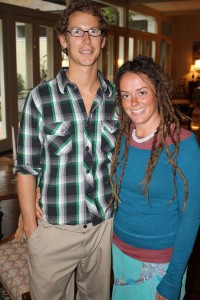
The Food Bank of Central Louisiana recently hired Lori to serve as the director of a new program called the Good Food Project. Produce raised in the organic garden, which is located adjacent to the Food Bank on Baldwin Avenue in Alexandria, will be added to the food boxes already distributed to low-income families in 11 parishes. The Good Food Project will allow for the creation of community gardens across Central Louisiana and will provide fresh, locally grown produce for area residents while teaching the importance of nutritious foods for good health.
Besides the vegetables already harvested, Lori has planted cauliflower, rhubarb, Chinese cabbage, broccoli, brussel sprouts, beets, red cabbage, six types of lettuce, garlic, carrots, two types of turnips, spinach, leeks, kale, several variety of peas, radishes, fennel and a multitude of herbs. The fall garden is designed to work in harmony with nature. “The garden is first a food source, but we want to teach the communities how to grow their own food sustainably. We are going to have a portable building for the workshops. We will teach about soil preparation, composting, water harvesting, mulching, irrigation and general gardening. We want to get all the communities in Central Louisiana involved in growing their own gardens,” Lori says.

Lori, and her husband, Eric Garton, have moved to Alexandria from New Mexico. They both have a love for nature, and each are dedicating their lives to the betterment of the planet. Lori grew up in Philadelphia, Pennsylvania, and Eric was raised in Orange County, California. The two actually met when Lori was working on her associate’s degree at Penn State University. “Growing up as a kid, I always loved animals. I wanted to be a veterinarian, so I started out in college in wildlife science,” Lori recalls. For three years in Pennsylvania, she worked on a 40-acre organic vegetable and herb farm. “Working there had just been a job, but things changed in New Mexico. I really realized I wanted to contribute to society. I wanted to be a producer,” she adds.
Eric and Lori both decided to attend New Mexico State University in Las Cruces. In New Mexico, the two worked at organic flower and vegetable farms. Throughout her college years in New Mexico, Lori worked at four different certified organic vegetable and medicinal herb farms. She saw first-hand how “community supported agriculture” can work. “People buy shares into the farm. They give more to the farmers and help harvest the farm. I saw first-hand how people can benefit from farming together, like a family,” Lori says, adding that experience prompted her to switch her major.
She earned a bachelor’s degree in horticulture earlier this year from New Mexico State University, with a concentration in sustainable agriculture. Eric, who graduated from NMSU in 2010, earned his bachelor’s degree in geographical informational systems. Eric, who also has 12 years of experience in the restaurant industry as a pizza chef, was one of a dozen students selected last summer to participate in the HERO Project at Clark University in Massachusetts. The HERO Project, which stands for human environment regional observatory, gives the participants research experience which focuses on social, ecological and mapping science.
When they first moved to Alexandria, Eric drove a truck to deliver food for the Food Bank, while Lori worked on getting the land ready for the organic garden. Eric is now employed as the geographical information system technician for Environmental Resource Management. The two have settled in their new home with their two dogs, Dexter and Bud.
Lori says they have planted their own garden at home for food, and that she is able to ride her bicycle to work. Through the Good Food Project, Lori hopes to not only feed people, but to educate them on how they can have their own community “food forests”. “Sustainable gardening means you are doing things in the way that the land will forever be viable. You are saving the soil, not depleting the nutrients,” Lori says, adding that she is not using chemicals with the Good Food Project gardens. While modern agriculture techniques and large machinery has enabled the “world to be fed,” Lori believes in more eco-friendly techniques.
“I believe we can still feed the world with one small farm at a time,” she notes. Lori hopes to educate the area residents in sustainable practices like soil building, using manure and worms. She plans to teach workshops on how to use rain barrels and basins for water harvesting, and implementing “gray water” systems for irrigation. Workshops will also be conducted on container gardening and square-foot gardening, as well as companion planting where certain plants are planted to attract beneficial insects and others are planted to detract harmful insects. “The more diversity you have in a system, the more beneficial it is,” Lori adds.
Lori is currently gathering tools and equipment for the upcoming workshops on organic gardening. Recently, the Soil and Water District has donated $2,000 as “seed money” for about 20 schools who will be creating organic gardens on their campuses. We are excited about all the possibilities in our area,” Lori says, “We are getting out in the communities and teaching people you don’t have to have elaborate gardens to have sustainability. We are going to be teaching them how to do the gardening, and how they can have their own gardens and reap some fresh and delicious benefits.”








